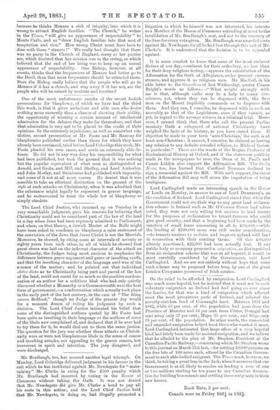It is some comfort to know that some of the
most eminent divines of our day,—eminent for their orthodoxy, no less than for their deep religions feeling,—approve the substitution of the Affirmation for the Oath of Allegiance, under present circum- stances, and approve it as religious men. Mr. MacColl, in his able letter to the Guardian of last Wednesday, quotes Canon Bright's words as follows :—" What weighs strongly with me is that, although oaths may be a help to many con- sciences, yet, where they can be dispensed with, the Ser- mon on the Mount implicitly commands us to dispense with them. And they can, I consider, be dispensed with in such an assembly as that of the Legislature, even if they cannot, as yet, in regard to the average witness in a criminal trial. More- over, I cannot think that those who call the present Parlia- mentary Oath a safeguard of national Christianity have weighed the facts of its history, as you have stated them. If objection be made to your term 'anti-Christian,' the oath is at least non-Christian ; it cannot, I conceive, be claimed as having any relation to any definite revealed religion, to Biblical theism in particular." These are the words of the Regius Professor of Ecclesiastical History at Oxford, and if the statement publicly made in the newspapers be true, the Dean of St. Paul's and Canon Liddon also support the Affirmation Bill. The Daily News, too, has learned that Cardinal Newman declined to sign a memorial against the Bill. With such support, the cause of the Affirmation Bill may well scorn the imputation of being irreligious.


































 Previous page
Previous page